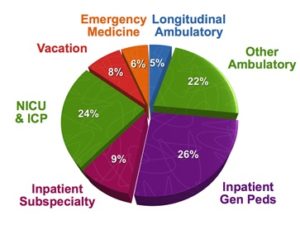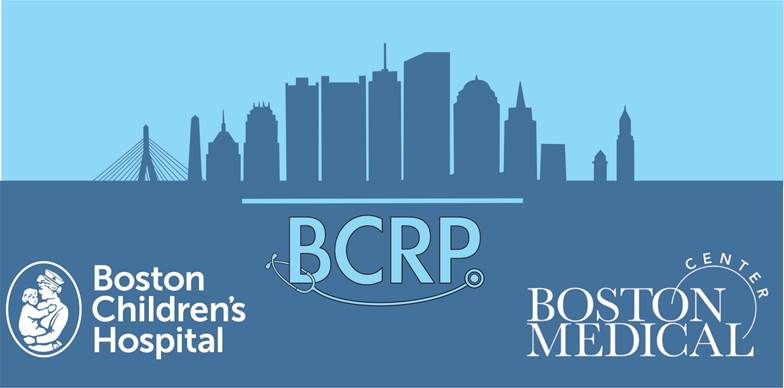First Year, PL-1
The intern year experiences are intended to develop a foundation of pediatric knowledge, along with the practical skills and confidence needed to work independently and supervise other residents in the subsequent years of the residency.
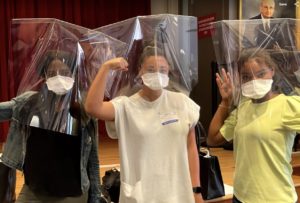
Interns take front-line responsibility for the care of patients in the inpatient wards, ambulatory clinics, and emergency departments at both BCH and BMC, as well as in the NICUs at BMC and Brigham and Women’s Hospital (BWH). In these settings, interns learn how to care for patients with a wide range of pediatric illnesses and illness acuities. Interns also participate in teaching medical students from Harvard Medical School, Tufts University School of Medicine and Boston University Chobanian & Avedisian School of Medicine.
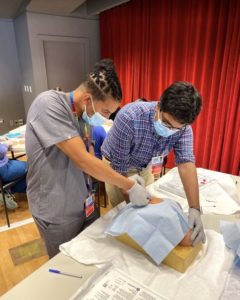
Building the foundation: Most of the inpatient experiences during the intern year involve covering the pediatric wards at both BCH and BMC. Interns also cover the Intermediate Care Program (a PICU step-down/floor step-up unit at BCH). This early exposure to higher acuity patients in a controlled and intimate setting allows them to hone their triaging skills and their management of ill patients. Neonatal experiences take place in the newborn nurseries and NICUs at BMC and BWH. Finally, interns work in the Emergency Departments of BMC and BCH. Interns also get an introduction to subspecialty care serving as front-line physicians on the three subspecialty teams (known as 6Subs, 7Subs and 9Subs). These subspecialty teams cover 2-4 different subspecialty services in the hospital and provide dedicated subspecialty teaching (6 Subs: Hematology, Toxicology and End-Stage Renal Disease team; 7 Subs: Endocrine and Adolescent team; and 9 Subs: Rheumatology, Allergy/Immunology, Pulmonary and Renal teams). Interns also participate in subspecialty consult selective experiences, which allow interns to customize their learning in their first year.
Ambulatory experiences: All residents belong to a Continuity Clinic, where they care for their personal patient population panel over the course of three years including occasional work in Urgent Care. In addition to this, interns participate in longitudinal ambulatory experiences in Developmental and Behavioral Pediatrics and in Adolescent Medicine during the Keystone blocks.
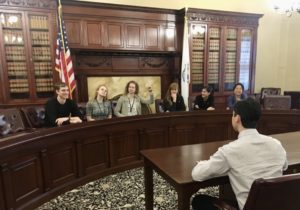
Advocacy experiences: All interns participate in 4 total weeks of formal advocacy training during their Keystone blocks. During this time, they gain knowledge of community resources and local and state advocacy programs, skills in media and legislative advocacy, and broader understanding of career opportunities in advocacy, public policy and global health.
PL-1 Rotation Schedule
| Service | Weeks | Night/Weekend Call |
| Inpatient Day Service (BCH Gen Peds, BMC Ward) |
3 on primary service 1 on “admit” or “flex” |
Work 1 full weekend and 1 half-weekend (aka 3 weekend days per 3 weeks) |
| Inpatient Day Service (6Subs, 7Subs, 9 Subs) |
2 | Work 2 weekend days (varies between x2 grey weekends vs 1x golden & x1 black) |
| Inpatient Night Service (BCH Gen Peds, 6/7/9 Subs, BMC Ward) |
2 | Work 5 nights on night float, off 2 nights over each weekend (Fri/Sat nights x 2) |
| Neonatal Intensive Care Unit | 2-4 | BWH: 3 weeks of days, 1 week of nights BMC: Day shifts. On 1 weekend |
| Newborn Nursery | 1 | No overnights. Work 1 weekend |
| Keystone: Child Development, Adolescent Medicine and Community Health and Advocacy |
6 (x2) | 4 to 5 nights in ICP, General Peds or Subspecialty services dispersed throughout Keystone blocks |
| Emergency Medicine | 2-4 | Day and evening shifts |
| Intermediate Care Program | 2 | Work 1 of 2 weekends |
| Sick Call/Back Up aka “Flex” | 0-0.5 | — |
| Admit | 1 | No weekend call |
| Vacations | Two 2-week breaks | — |
| Continuity Clinic | 1 afternoon/week on average | Increased frequency of clinic during outpatient “Y” weeks |
